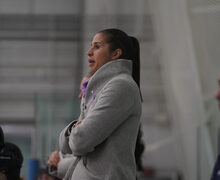Malliaros: Fashion Industry accepts transgender models
The fashion industry has always carried a certain shock factor. Runway shows, catalogues, advertisements and one-on-one interviews with designers have all proved the industry to be extremely liberal. Fashion is art, and art rarely has boundaries. It’s all about expression.
The recent breakthrough of transgender models in the fashion industry has been welcomed with open arms.
According to an exclusive interview on the Australian show “Sunday Night”, Andreja Pejic was discovered by a talent scout while working at a McDonald’s in Australia. Pejic was Andrej, a Serbian-born teenage boy growing up in a refugee camp during the Bosnian War.
Since then, Andreja has skyrocketed to fashion stardom. In 2010, she arrived in Europe and caught the attention of influential editors and designers.
Standing at 6’1” with full red lips and cheekbones that could cut diamonds, she fits the model look and can model both womenswear and menswear.
Pejic’s first professional job was modeling for the cover of Australian fashion magazine, Oyster, but it didn’t stop there. During her first Paris season, she was cast by menswear designers including Raf Simons, John Galliano, Paul Smith and Jean Paul Gaultier.
In the following seasons, Gaultier booked her not only in his menswear show and ad campaign, but also in his ever-so-famous haute couture show and cast her as the last model to walk, the most important role of the show.
From then on, Pejic’s popularity surged. She has been cast for countless magazine editorials, ad campaigns and runway shows.
“I have to say the reaction has been pretty positive. I think there’s a level of respect that didn’t exist when I was growing up, definitely, toward these issues,” Pejic told Time Magazine.
Needless to say, Pejic has been widely accepted in the fashion industry. Her charisma, along with her keen features, has pushed her into some of the most chic productions of the decade.
Transgender women have appeared on the runway and in magazines since before the word was widely known, including April Ashley, Caroline “Tula” Cossey, Teri Toye and Connie Fleming, who gained fame in the 20th century.
Barneys New York debuted a successful ad campaign in January featuring transgender models. Some had experience, and others signed to agencies following the running of the ads.
“It was truly thrilling to see how receptive the media and public was to the campaign,” said Dennis Freedman, Barneys’ creative director, in an interview with The New York Times.
It’s fantastic that just about anyone can blossom into a masterpiece like so, but I can’t help but wonder how the runway differs from the real world for these individuals.
The LGBTQ community has been growing rapidly, and society has become more open to different kinds of lifestyles. Despite that, many people have not adapted to these changes yet.
The presence of models like Pejic in the fashion press is fascinating, but that world is very different than day-to-day life. Models can’t expect the same treatment on city streets as they do from editors and casting directors. Most people aren’t looking for what will create publicity or increase the value of their brands. Yes, the world’s opinions are changing, but many are still quick to judge when it comes to these radical changes.
The fashion industry is doing its part in the movement toward equality. Employing transgender models and empowering their groups will help them feel more comfortable. There is a lot more work to be done, but this is a brilliant beginning.
Published on September 15, 2014 at 12:01 am





